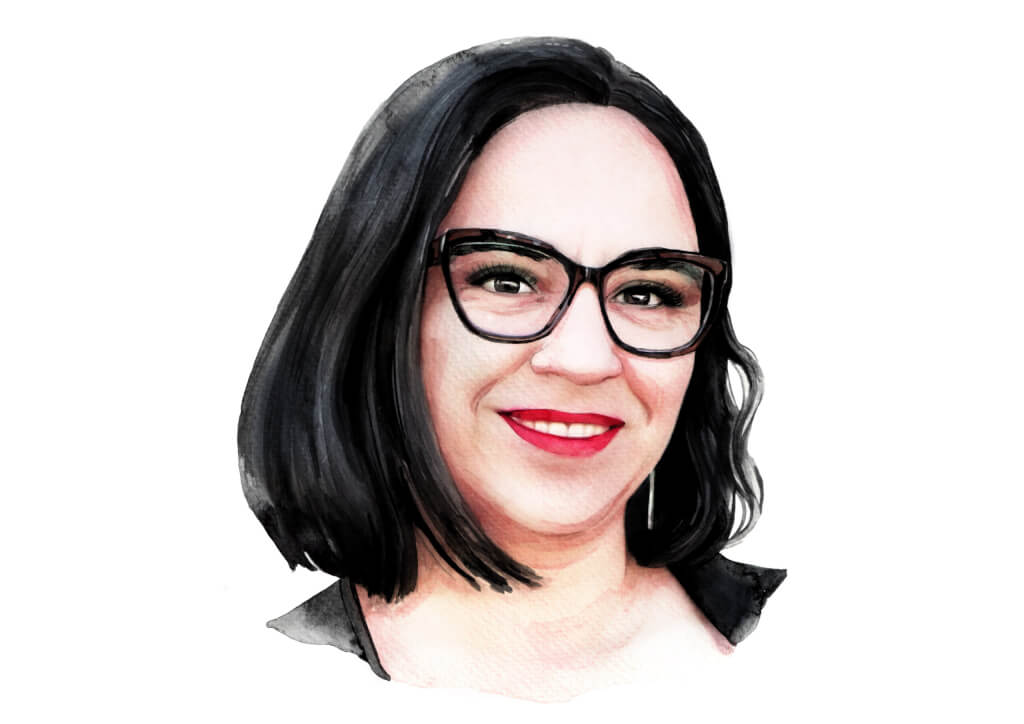Maribel Aburto – Founder in Branding and Web Design

Growing up in Santiago, Chile, in the 1980s, Maribel Aburto couldn’t imagine life beyond the confines of the country’s military dictatorship. “I lived most of my life in one of the poorest or most marginalized areas in Santiago. So I saw, and I heard as a child, a lot of the things that were going on around, a lot of violence, protesting, a very tense childhood.”
But with that, Maribel also recalls the pockets of warmth. She grew up in a large, tight-knit family, with a brother and sister and many cousins. Her parents worked hard to support their children, her mother was a housekeeper, and her father was a building concierge. As a result, the young Maribel spent a significant amount of time with her extended relatives. Amidst the societal turmoil, she felt the protection of her family unit.
As a child, Maribel loved to draw and dance and would sketch out ballerinas, dreaming of the day she’d take the stage. But even at a young age, with the surrounding political tensions, she knew the possibility was largely inaccessible. Beyond the fantasy, her notion of adulthood was straightforward. “I didn’t have big plans like going to university or studying or anything like that. It wasn’t common in my family. Usually, you finish school and go to work.”
It wasn’t until high school that Maribel began to assess her life’s path closely. Her mother selected a Technical-Professional school on her behalf, which is a popular educational avenue in Chile, and offers multiple pathways of career-readiness training. As a bonus for Maribel’s parents, it was a catholic institution, close to home, and government subsidized. To graduate, Maribel had to complete four years of studies and a fifth-year internship. She entered her first year intending to pursue the secretarial route but unexpectedly gravitated towards the newly introduced pathway to becoming a librarian.
During her fifth-year internship, Maribel, and her now spouse, became pregnant with their son. The couple, who met at school, faced disapproval from their congregation and Maribel’s school administration. Despite the backlash, Maribel graduated successfully and shortly thereafter, began working as a librarian at the ‘Federico Santa Maria University’ in Santiago.
Her first year of work was both challenging and enriching. She enjoyed her job and developed strong friendships with her co-workers, but she felt the pull to pursue the passion for creative arts she developed as a child. Maribel enrolled in night classes at a local institute for graphic design; it was a dual investment in her fulfillment and in the expansion of professional opportunities. But the preparation for a better future came with the sacrifice of time with her family. Maribel’s mother watched her son on weekdays, which only left the weekends for quality time with her son. For Maribel, she was sure her endeavors were worthwhile.
She completed her graphic design degree in two and a half years and was eager to leverage her new experience.
At the same time, her now spouse was in university, studying to become a computer engineer. In a month in 2002, the couple married, her spouse graduated, and they bought a home. Once again, it was both a joyful and intense period in their lives. They welcomed their daughter in 2004, and Maribel left her job as a librarian to work as a stay-at-home mother for several years. Graphic design had limited earning potential in Chile, and what she would make from full-time work would not be worth the cost of childcare. So, Maribel tabled her career with the fortune of the financial stability her spouse’s job provided. She took on small graphic design projects on the side to keep her skills sharp but mostly remained focused on her family.
One evening, Maribel and her spouse saw a feature on the news about Australia’s visa program, designed to attract global talents and skill sets. “My spouse looked at me and said, ‘Let’s go to Australia.” And I said, ‘Okay.’ And that’s it.” They explored the opportunity and were deep in the application process when Maribel’s spouse received an invitation to conduct research at the University of San Diego, California.
Australia would have to wait; they decided and headed for the States instead. While there, Maribel received a working permit, landed a part-time job at a Subway sandwich shop, and resumed freelancing sporadically. She drummed up business from friends and, as a natural progression of her skills, started learning website design using the program Dreamweaver. She was not fond of coding initially, but it became critical to her earning an internship with a web design company a year later. The internship accelerated her education in the field and appreciation of the skill.
While California was a dream, with the beautiful weather and abundance of beaches, Maribel and her spouse knew they didn’t want to stay in the U.S. forever. After two years stateside, they returned their focus to Australia. The family obtained their visas but couldn’t afford to move without jobs secured in advance. During their search, Maribel’s spouse found a posting perfectly tailored to his niche resume. The only catch: the position was in Wellington, New Zealand. “Okay. Wellington, New Zealand. Where is that?” they thought. “How is it? We had no idea. But…we needed to apply.”
Fifteen minutes after his interview ended, Maribel’s spouse received the job offer. The Australian visas permitted the family to live and work in New Zealand, and the opportunity was just the right fit – they couldn’t take it.
So in 2009, the family headed for Wellington, dashing their hopes for Australia again. For Maribel, as a migrant mother still learning English, it was a challenge to land work in her new country. She held some part-time jobs in retail and hospitality while garnering scattered freelance gigs by word of mouth. She continued to expand her web design skills and fluency in English to improve her marketability.
Eventually, she was signed on as a contractor for a local designer in Wellington. The position lasted a year and provided the flexibility for Maribel to balance both her work and family. She next landed at another local company, providing web design and support for their clients. Here, Maribel built upon her customer service experience, troubleshooting for and educating clients on how to use their websites.
A year later, Maribel’s employer wanted her to take the role full-time, but with kids in school, it wasn’t a good option, so she had to leave. Growing in her mind was a wild and exciting idea: to open her own studio alongside her friend, a fellow migrant woman and graphic designer. The choice Maribel made would be a defining moment in the progression of her career.
The friends leaped together; it was beyond appealing to be autonomous business owners and carve their paths. Maribel’s partner faced the same wall in her career: she was a migrant mother who could not secure full-time work. This pervasive experience became the foundation of their company’s business model and philosophy: to invest in the migrant women of their community by creating employment opportunities. “And that’s how we realize we could bring more ladies to the team, people like us, the people who are having the same issues that we had before funding our business.”
Eight years later, their vision continues to be a radical success. Currently, seven women are contracted – all are mothers and/or migrants, and each retains flexible hours. The company primarily offers branding and web design, Maribel runs the business, and her business partner shares the managing of projects. In this venture, Maribel relishes the control she has over her own professional experience and growth. She works from home, which allows her to look after the kids, and her investment is now paying off. “I love what I do now, and if you ask me, would you like to go back to work for someone else, it’s like, ‘no, no, no!’”
Eventually, the goal is to bring the contractors on as formal employees, but with precarious seasons of highs and lows, they are not positioned for that step just yet. To improve the company’s growth, Maribel signed up for Hello Seven, a consultancy that provides business and finance coaching and education for women. And since, Maribel’s studio surpassed one hundred thousand dollars in revenue, a milestone achievement for her and a reflection of her sacrifices and long-term persistence.
Within the next three months, Maribel and her spouse will be moving to Dublin, Ireland. Europe was always in the pipeline, but the timeline drastically increased with a recent job opportunity Maribel’s spouse received. The timing turned out to be perfect, even if unplanned. Their son is now 27 and on his own, and their daughter, 18, almost graduated from high school. She will take a gap year before college and join her parents in Dublin a few months after their departure.
The core of Maribel’s business will stay in Wellington; many of her direct clients are local, and her co-founder is solidly planted there. They plan to capitalize on this move to expand the business deeper into the European and U.S. markets.
Maribel has played the long game, expertly so, holding close to what could be possible. And the leaps Maribel has taken in life appear to be easy on the surface, but her achievements are now ones she could have conjured as a child. “If I do that, go back and tell [her younger self] what had happened so far, she wouldn’t believe me.”
And while Maribel didn’t become the ballerina from her drawings, as an adult, she joined a Latin women’s dance group. Throughout her life and career, she has either found spaces for community and expression or paved the space herself. “Things, things that are, seems impossible – it can happen. So dream big.”
